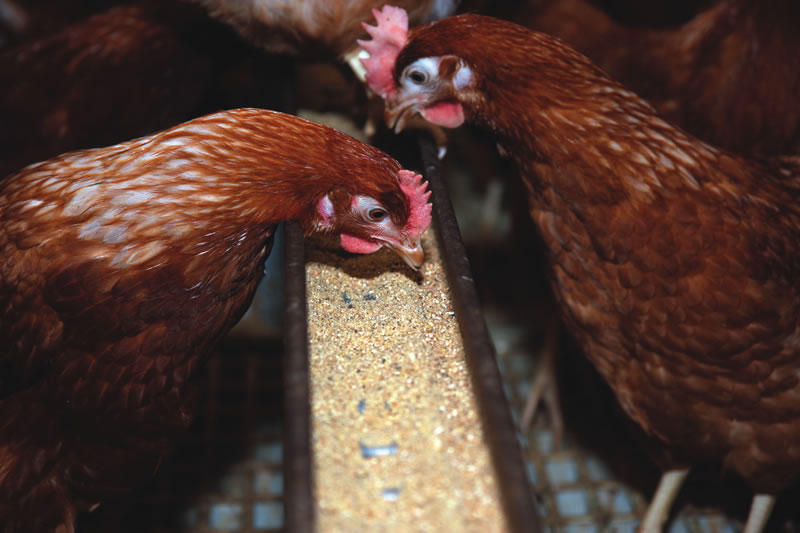
Noble Foods says it has had a huge response from free range egg producers to its new feed tracker contract.
The company – the United Kingdom’s biggest egg packer – launched the new contract after agreeing a deal with the supermarket giant, Tesco. The contract effectively insures producers against large increases in the price of soya and wheat by tying the price they receive for their eggs to rises in the cost of feed. It also protects producers from any collapse in the market price of eggs by ensuring that producer prices can only rise and fall in line with feed prices.
The new contract is now up and running and Tom Willings, Noble’s contract producers and farms director, says the company saw massive demand from producers who wanted to join the new scheme. “It was oversubscribed. We had far more subscribers than we could fit in,” said Tom. “We could probably have signed double the number up to the contract, but that is not possible at the moment.”
Tom said that Noble marketed eggs from six million free range hens. The owners of 1.5 million birds – 25 per cent of the overall total – were now on the tracker contract. “The contract has been positively received by everyone – by producers, by companies. We were oversubscribed within just three weeks.”

Noble said when it outlined the new contract that it would not necessarily be suitable for everyone. The tracker contract may not be suitable for producers who prefer to take the chance on the price of feed in the hope of making a batter margin. However, the company felt that the contract would be attractive to those who wanted to protect against “unforeseen future inflation.” Those who have signed up for the tracker contract receive 2.5 pence per dozen less for their eggs than other producers, but their egg prices will automatically increase by 0.1 pence for every 50 pence per tonne increase in the price of feed.
The launch of the new contract was welcomed by Robert Gooch, policy director with the British Free Range Egg Producers’ Association (BFREPA), who had been pressing for some time for packing companies to look at the possibility of offering tracker contracts. When Noble launched the tracker, Tom Willings, himself, said that the principle of reflecting feed cost movements in the price of eggs had long been debated. He said, “Until now, the risk of volatile commodity markets has been at the door of the primary producer. As the industry saw between 2010 and 2012, this can have a devastating effect on a business where feed can represent up to 70 per cent of the cost of production. This is a risk that Tesco have recognised and have been working with the industry to help find a solution for.”
After the contract came into force, the Ranger asked Tom whether there was a possibility that other producers who had failed to get onto the current scheme would be able to sign up for a tracker contract with Noble in the future. “Certainly I would like everyone to have the choice to be able to do so,” he said. “It should be available to all producers, but Tesco were brave enough to do it first.”
Tom said that Noble was talking to other customers, and he hoped that those conversations would result in other producers being able to take a tracker contract in future. He said that the tracker was good for everyone involved because any increase or decrease in the price paid to producers was handled automatically, leaving Noble and its producers to concentrate on the main job of producing good quality eggs.
Producers wishing to sign up for the tracker contract were required to sign up to Noble’s producer scheme, under which producers source both feed and pullets from Noble and use the company’s spent hen service. The Ranger believes that some 70 per cent of contract producers supplying Noble with eggs were already on the producer scheme when the tracker contract was launched.
Tesco’s readiness to become involved in tracker contracts with egg producers may stem from the fact that the retailer already had such contracts with other farmers – most notably milk producers. Robert Gooch said that Tesco already operated a successful cost-linked contract for dairy farmers and, from what he had seen, farmers who were on that contract seemed to have done fairly well.
At the time of the Noble tracker contract launch, he said, “I welcome the fact that we will now see it in the egg industry and that producers will now have a broader range of contracts to choose from.” He said the offer of stability may be attractive to some producers – particularly producers with high borrowings who may want to keep the bank manager happy.
Tesco, which has been looking to improve relationships with its suppliers after coming under scrutiny by the groceries code adjudicator, said when the new egg contract was launched that it was a “significant step in strengthening our relationships with producers.”
Tom Hind, group agriculture director of Tesco, said, “Commodity market volatility is a challenge for our customers, for Tesco and our producers. Through developing a mechanism that reflects variable production costs in the prices we pay our egg suppliers, we’re better able to manage this risk together.
“This is an important and significant step in strengthening our relationships with producers in order to secure supply and deliver for our customers.” He said that, earlier this year, Tesco had launched the Tesco Sustainable Egg Group, which enabled the company to “take these relationships further with our suppliers and farmers” and understand how it could deal with big challenges like volatility.
